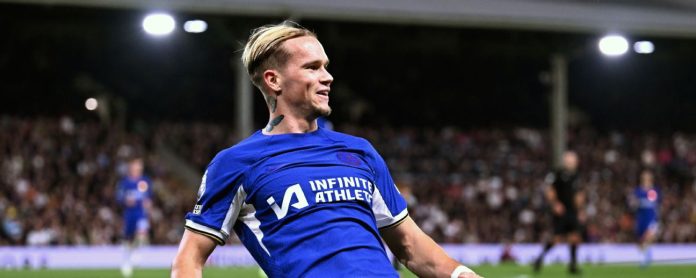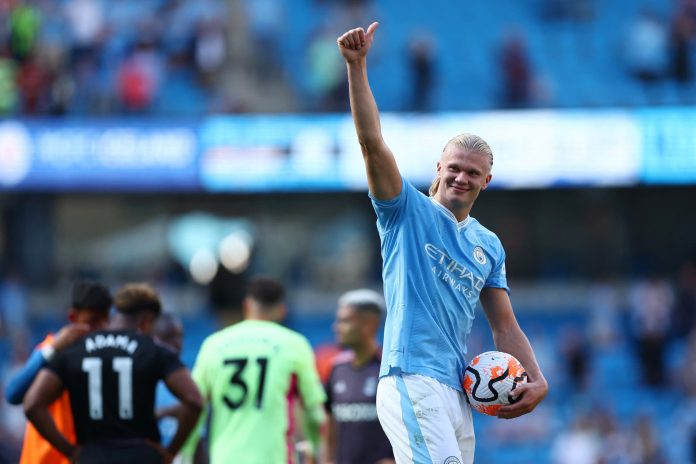All the football purists enjoying the sight of Chelsea’s stripped-back kit for the first six gameweeks of the season may have been slightly taken aback to see them debut their new sponsor against Fulham on Monday night. In light of the latest new firm to infiltrate the top-flight, we take a look at where Infinite Athlete rank among the biggest sponsorship deals in the Premier League this season.
- Chelsea and US sports technology giants Infinite Athlete struck a deal worth £40m-per-season in August
- It places the Blues firmly among teams with the biggest sponsorship deals in the Premier League
- SportsLens take a deep dive to see which teams and their commercial partners hold the most lucrative agreements
All sponsorship data courtesy of SportsProMedia.
Biggest Sponsorship Deals In The Premier League
=4. Chelsea and Infinite Athlete (£40m-per-season)
For a team who reported operating losses totalling £235m in 2021/22, identifying a new key sponsor for this season took an alarmingly long time.
The unprecedented period of investment under owner Todd Boehly in the space of little over a year is truly staggering, and the Clearlake Capital-led consortium will almost certainly be breathing a sigh of relief, after the Blues finally penned a deal for a brand new shirt sponsor.
US-based sports technology firm Infinite Athlete, whose logo could be seen emblazoned on Chelsea’s shirts for the first time in their win over Fulham on Monday, will pay £40m-per-year for the privilege.
Despite agreeing to the deal almost two months ago, the Premier League expressed concerns over ‘fair market rules’.
Infinite Athlete were only created a week prior to Chelsea opening negotiations; red flag number one. One of the company’s key investors is the firm Silver Lake, who have ties to sporting apparel brand Fanatics.
Fanatics are backed by hundreds of millions of dollars worth of investment from Clearlake Capital, the consortium that led Boehy’s takeover in May 2022.
Add to that an estimated turnover of just £12m-per-year, which equates to just 30% of the £40m they will pay to Chelsea in 2023/24, and you have a cacophony of questionable narratives feeding into the deal.
Nevertheless, the Premier League’s Fair Market Value regulations are fairly standardised, and £40m-per-year matches that of clubs with a similar stature. It also dictates that a deal can not be blocked on the grounds of links to the owner, despite suggestions that cash is now being funnelled directly into the club by associated investors.
It is also worth noting the Premier League blocked a deal with Paramount over fears of upsetting the league’s existing broadcasting rights holders. Heavy backlash from the club’s supporter’s trust in light of a potential deal with global gambling firm Stake also saw them pull out of a deal worth significantly more than the one just signed.
RELATED: How Chelsea And Todd Boehly Are Sidetracking Financial Fair Play With Long-Term Contracts
=4. Tottenham and AIA (£40m-per-season)
Tottenham’s current shirt sponsorship deal with multinational insurance company AIA has been among the Premier League’s most lucrative since 2019.
Now entering the half-way stage of the eight-year deal worth £320m, Tottenham benefit from £40m-per-season as a result of their partnership.
Although AIA themselves claim they are promoting ‘healthy living’ by sponsoring one of the world’s top football teams, a report by fossil fuel divestment activists in 2020 divulged a far uglier truth.
The Hong Kong-based company holds a stake of at least $3bn in coal-related projects, ranking their mission, or lack thereof, to combat climate change among the lowest of any of the Premier League’s sponsors.
3. Manchester United and TeamViewer (£47.5m-per-season)
German remote computer software brand TeamViewer are entering the second of their six, £47.5m-a-season deal, but rumblings of Manchester United actively seeking a new sponsor were confirmed, after it was announced technology firm Qualcomm Snapdragon will take take over next season.
Although through no fault of their own, TeamViewer’s Trustpilot score plummeted from 4.5 to 1.1 following the announcement of their sponsorship deal in May 2021, with Manchester United fans flooding to the review site in a bid to drive out the Glazer family.
By rallying against their global partners, fans hoped that by piling on negative reviews, TeamViewer’s reputation would be tarnished, and in turn, the Glazers would be adversely affected.
2. Liverpool and Standard Chartered (£50m-per-season)
The majority of Liverpool’s sponsorship money comes from their front-of-shirt partnership with multinational bank Standard Chartered, who agreed to an extension on their initial 2019 deal, which will see them pay £50m-per-year until 2027.
Their agreement with Standard Chartered is one of the longest running sponsorships in the Premier League, having first appeared on the front of Liverpool kits back in 2010.
Despite entertaining other investors from the cryptocurrency and sports sector to submit proposals before the latest extension, the partnership has largely been viewed as a major factor behind Liverpool’s ability to compete with some of the league’s most affluent teams. £50m-a-season ranks them as the second biggest sponsorship deal.
Much like Tottenham’s situation with AIA, activists have called into question Standard Chartered’s environmental endeavours with the bank loaning billions of pounds to fund fossil fuel projects.
MP’s also wrote to Liverpool’s CEO last summer in a bid to get the club to cut ties with their sponsor, who endorsed authoritarian national security law in Hong Kong, saying it would “help maintain the long term economic and social stability” of the city.
1. Manchester City and Etihad Airways (£67.5m-per-season)
Manchester City’s sponsorship deal with Etihad Airways has been a permanent fixture since the Abu Dhabi United Group takeover in 2009, with the club receiving £67.5m-per-year in an open-ended agreement.
It is the most lucrative front-of-shirt sponsorship deal in Europe, just ahead of Fly Emirates and Real Madrid, and of course includes the naming rights to the Etihad Stadium.
City’s agreement with Etihad Airways has not been without its fair share of controversy however.
A 2015 US aviation industry document made the bold claim the Abu Dhabi government itself was paying for the sponsorship money, rather than the airline emblazoned on the front of their shirts.
Manchester City were also handed a two-season ban from the Champions League, along with a £30m fine, after being found guilty of concealing sponsorship payments in 2015-16. Etihad Airways were believed to have not wholly funded its annual £67.5m-a-year agreement.
This was, of course, turned over by the Court of Arbitration for Sport who could not fully establish, or were time-barred from exploring the accusations.
Amid claims of 115 breaches of financial regulations since 2009, City also announced a dubious agreement with global betting partner 8Xbet last summer.
Firstly, the firm’s founder has no digital footprint that matches with public record, while a deep dive into 8XBet’s LinkedIn account revealed just two listed employees, neither of which appeared legitimate.
Although they are believed to be an Asian-facing company, a report by Josimar suggests their social media data indicates the administrator resides in United Arab Emirates – the state of City’s owners – which is also a nation where gambling is illegal and punishable by a custodial sentence.
Related Football Content
- Football Betting Tips 2023 – Latest Picks & Football Tips
- Football Predictions October 2023
- Football Accumulator Tips 2023 – Latest Acca Betting Tips
- Best Correct Score Tipsters on Telegram & Social Media 2023
Add Sportslens to your Google News Feed!







